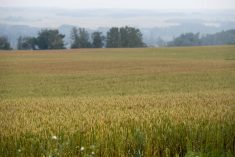Farming sisters feel tough conversations needed to ensure all five siblings feel included in the transition conversations
A difficult farm transition that threatened to create a rift in her parent’s family has confirmed Chelsea Pellerin’s belief in the importance of a clear, written farm transition plan.
A conversation 15 years ago of how the farm would be transferred, but not spelled out and didn’t materialize, was a wake-up call for Pellerin, who farms with her parents and sister near Westlock, Alta.
“The good thing that came from it for my sister and I is that Dad is seeing how important it is to have all your ducks in a row and things to be signed and laid out before anybody passes away,” said Pellerin, of the difficult farm transition in her father’s family.
Read Also

Accurate accounting, inventory records are important
Maintaining detailed accounting and inventory records is not just a best practice; it’s a critical component of financial health, operational efficiency and compliance with programs like AgriStability.
Pellerin and her sister, Kassidy, are full-time farmers, young mothers and are working toward taking over the family farm from their parents. But Pellerin believes tough conversations are still needed to ensure all five sisters feel included in the transition conversations and they avoid family strife.
“It is important to have those conversations, and not only to have those conversations, but to have the conversation but then to get the ball rolling and make sure those changes are made. It is so important for transparency and for everyone to know what is going on. It doesn’t take long for things to go sideways,” said the University of Alberta agriculture graduate.
“As of right now we are having these conversations and there is a fire lit under Dad’s ass because he sees the importance of them.”
Pellerin and her sister have farmed with their parents for about eight years. The two farming sisters receive about $25,000 a year each for their work on the farm. The rest of the money earned is invested back into the farm.
But as part of the discussion, Pellerin also wants an acknowledgement by the rest of the family of the labour and money she and her sister have already invested in the farm.
“We’re close and don’t want those ties to be broken, but it can happen at the flick of a switch when you are talking about a substantial amount of money.”
While Pellerin can encourage farm transition conversations and decisions, as one of the daughters wanting to take over the farm, she knows it is out of her hands and it is up to her parents to ensure there is a clear road map of what the family farm will look like in the future.
While nothing has been finalized and ideas have changed in the past few years, the two sisters plan on taking over part of the farm debt with a next-generation loan from Alberta Financial Services Corp. However, they must first arrange to have 25 percent of the farm company shares legally transferred to them.
“We need to have those shares in our names. If something happens then we do have some equity to cover most of that debt.”
Conversations, lawyers and decisions all take time. What is a good idea one year is often rejected the next as families, health, income and finances change.
“It is not something you can have three conversations and go to the lawyer. Those conversations need to happen at least monthly. ‘This is what I am thinking. This concerns me.’ The hard thing is Dad and I will be in the shop and having a conversation and Mom and Kassidy are not around,” she said.
“It is not an easy road to navigate. There is always such secrecy with farm transitions.”















